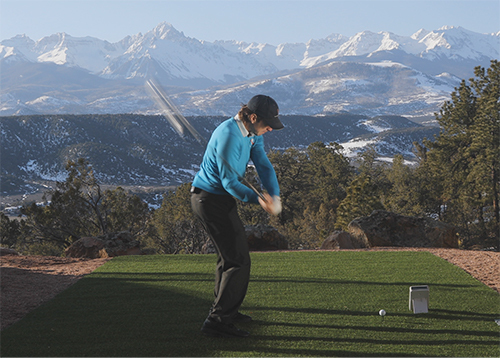Tony Finau's Power off the Tee
Tony Finau's Power off the Tee
Description
Learn how to reproduce Tony Finau's power RotarySwing move for more distance off the tee! Watch You Hit the Ball with Your Legs to see the video I mentioned

Hey, guys, so after Tony Finau made the hole-in-one at the Masters the other day, and then dislocated his ankle, and in a very manly fashion, put it back in place and continued to play, and then he goes out and shoots four under in the first round. He definitely deserves a swing review, and since I actually have met Tony, and his younger brother Gipper, I'd Monday qualified into the Utah Open years ago, about ten years ago, and Tony and Gipper were still playing around on the mini-tours, and actually played in the Utah Open with me as well, and I was practicing out in Glenwild where they were practicing, and I got to meet them, and I watched them hit balls, hit balls next to them, and to say that they hit the ball a long ways back then was definitely an understatement. I think Tony has throttled it back a little bit now that he's on the Tour. His younger brother Gipper, I haven't seen him in many, many years, but they both murdered the ball off the tee, and I want to talk about the fundamentals that allow Tony and Gipper to hit the ball as far as they do, and talk about how it applies to your golf swing.
So, first let's take a look at setup. Everything that you're going to see here, stock RST. This is classic rotary swing tour positions. He's got axis tilt here. We can check that by line through buttons on his shirt and his belt buckle. Perfect. His head ... With the driver, you're going to tend to be a little bit further behind the ball. You're trying to catch it a little bit on the upswing. All of this stuff, great positions right from the get-go. So, we're given a great primer to hit the ball a long ways, and the setup is critical.
For those of you who don't get setup correctly, there's lots of little things that you can see in his setup apart from the axis tilt. I see a right knee for golfers kind of rotated out to the right, externally rotated, and this leads to over hit rotation. It makes the downswing transition very, very difficult so note that the right knee laser beam for when I talk about on the site is exactly this. He's almost got that right knee kind of imagine that it's pointing at the ball. It keeps that right leg anchored in, which is critical for a good wind up in the backswing, but let's talk about how he moves the club back.
One thing you're going to notice right away, he's settling into that right side as you see him shifting to right, and now one of the critical, critical pieces that we talk about all the time is being able to make that full turn, and how do we measure that. We want to see that right shoulder blade on the left side of your head when you're looking at your swing face on. Now, so many golfers think that they can't make a full shoulder turn because it's a flexibility issue, and I've proven time and time after, it's never a flexibility issue. It's purely where your priorities lie. If you try and turn your shoulders, even while you're sitting here listening to this video, while you're sitting in a chair, pull your right shoulder behind your head even without moving your hips, I guarantee you you can get at least 45 degrees of separation between your upper and lower halves, and then as you allow your hips to turn another 45 degrees, everybody can easily make a full shoulder turn. So, make sure this is what you see at the top of your swing, that you can see that right shoulder blade on the left side of your head.
Another thing I love about Tony's swing is he maintains width. Notice how straight that left arm is, and so many amateur golfers want to let that left arm collapse at the top, and you lose the radius of the width of your golf swing, and width is free speed. You don't have to work harder to swing the club faster. There's a reason your driver goes faster than your pitching wedge because the simple fact is the club is longer. So, keep that width. Take advantage of the leverage that you have in your swing. Don't let this left arm collapse because that's just shortening the radius of your swing, and you're turning that driver into a 5 iron. You'll never, ever be able to swing it fast when you lose the radius in your swing. So, tons of width. He's almost as if he feels like his hands are as far away from his head at the top of his swing as he can get.
So, this is another. You got three key power moves. One, he's loaded into that right foot. Two, right shoulder behind his head. Three, maintain the width and radius of the arc at the top, and you'll notice he's even made a short swing here at the top without setting his wrists too much at the backswing. Watch what happens as he starts down. Oh, went a little too far there. Sorry.
So, now, as he starts down, you'll notice that the angle has increased between the shaft and form compared to what he had at the top. This is what we call a down cock move. This is what's in the down cock drill on the site. What you're doing, you don't want to fully set your wrists at the top of your swing. You want your wrists to be relatively relaxed so that as you shift your weight back to the left, the force of the movement of your arm is getting pulled back by your hips, and the club going in the opposite direction sets your wrists even further, and Tony has done that perfectly here. That's a perfect amount of lag. You don't need any more than this, and now, as he's continuing to shift his weight and get ready to post up, I want to talk about what his big power move here.
Again, maintaining lag, maintaining lag, and now watch this left leg. We're going to focus just on this. This is critical so pay close attention, and as he shifts it over, watch how the left knee begins to straighten and push his left hip back and open. Now his hips are open to the ball, facing more toward the target, and that left leg straightening has pushed the left hip back, which helps you maintain the tush line, which helps you maintain the angles in its swing so that he has a proper swing plane that this move is assertive in Tony's swing. In fact, as you watch, he's so far ...
Notice, too, what do you notice here? Not on the ball of his foot, is he? Of course not. You want to be aggressive and powerful, you need to engage that glut, quad and hamstring, and to really engage the gluts and hamstrings, you need to have your weight back over the ankle, which of course is a RST fundamental. So, as he's doing this, he's firmly planted on this left leg. I see all the time that golfers look like ... That their left knee looks like this at impact. They never, ever post up. They don't push that left foot into the ground. They don't push that left hip back, and they don't get assertively posted up because that post up move is what helps you release the golf club. He's releasing this golf club not with his shoulders, and trying to turn his chest, he's posting up that left leg, which is releasing that lag angle that he had on the way back, or on the way down. Excuse me. So, notice that left leg, nice and straight, and then around into the full follow through.
So, the main video I want you to focus on today is the power move that I talk about in you hit the ball with your legs video. That is your focal point for today. Watch Tony as he's going through the Masters. Hopefully, he'll have a great rest of the weekend. We want to see him do well especially after nearly destroying his ankle here, but this is the main thing that you can learn from Tony's swing.
Testimonials

-Dr. Jeffrey Broker, Assoc. Prof. in Biomechanics at University of Colorado at Colorado Springs and Former Senior Biomechanist for U.S. Olympics Committee

-Hub Orr - Happy PREMIUM MEMBER of RotarySwing.com

-Sam Jarman, PGA Golf Instructor in the UK

Build the perfect golf swing following the most advanced online golf swing learning system!
JOIN OUR 445,147 MEMBERS AND GET INSTANT FREE ACCESS TO DOZENS OF VIDEOS!



